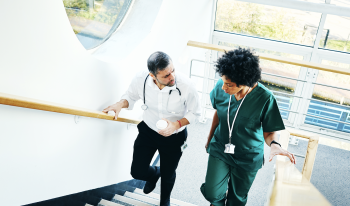Clinicians have crushing caseloads. Under this weight, they often feel they must move quickly from one bedside to the next in an effort to provide care for all their patients. When patients express gratitude for the care provided—whether the outcome is positive or negative—the clinician may feel that it is best to humbly respond by saying, “I’m just doing my job” and push on to the next case. However, taking a few moments to accept the patient’s gratitude pays dividends for both the patient and the clinician.
Clinicians are most comfortable analyzing and solving problems. In fact, they are trained to focus only on the medical problem at hand.
When you operate, you drape everything, so you have a very small square that is your area of focus. You don’t see the eyes. You don’t see the nose. You don’t see the face. And that allows you to do some very invasive techniques, but it also dehumanizes the patient.
—Clinician (Vascular Neurosurgeon)
From the clinician’s perspective, allowing their focus to shift to emotion—both theirs and their patients’—could get in the way of solving the medical problem. And, yes, many clinicians feel uncomfortable responding to an outpouring of gratitude.
It’s uncomfortable when someone tells you, “Oh, thank you so much! You saved my life!” Usually that’s my cue to say, “I’m just doing my job…”
—Clinician
Now, consider a different perspective from another clinician:
You don’t want to minimize what may be the most important day in the patient’s life—a foundational moment in their life—by saying you were just doing your job. They don’t want it to be just a regular day for you. I’ve learned to adjust how I approach those moments. It’s an intimate moment when somebody is talking about what they want to give you.
—Clinician
It’s not surprising that patients and family members say they feel good when the gratitude they extend is acknowledged. They feel empowered because their clinician has taken the time to really listen to them. And that feeling can lead to deeper engagement—going beyond being a recipient of healthcare to becoming part of the team through volunteer efforts or philanthropic contributions.
It’s important to recognize that even if a patient’s medical outcome is negative, family members still feel the need to express gratitude for the care their loved one received.
While some families may not have had the best outcome—perhaps their family member passed—they have gotten so involved with us, with the team, with the care that we provide, that they view us as part of them. They know we’ve tried our best and that, despite what happened, good care was given. A lot of the time when families express thanks and want to do something more, they’re doing it because they want to feel like they’ve contributed, that they’ve given back. And it helps provide closure for them.
—Clinician
That sense of connection and healing a patient and their family feels when a clinician appropriately accepts gratitude is not a one-way street. The clinician also benefits. It allows them to slow down for just a moment and see the person behind the ailment.
When we’re doing rounds, and the patient says something nice, now we pause for a moment, and sometimes we’ll get a little more information. They’ll give us a little background story that makes them more human, more than just the patient lying in the bed. That’s been helpful for the team and myself. Accepting gratitude has improved the general interactions I have with patients.
—Clinician
Clinicians tell us that these kinds of interactions nourish them emotionally, as well.
Too often, we’re so rushed for time. We’re trying to see the next patient, write the next note, or do the next procedure. To look someone in the eye, receive thanks, and give gratitude back is very powerful for your own well-being as a physician or a provider. I think people should absolutely take advantage of that. It’s free therapy.
—Clinician
Help your clinicians understand the importance of accepting gratitude and how to respond appropriately by attending a public offering of our robust training, Dynamics of Clinician Engagement, designed specifically for medical development professionals. Interested in a more customized approach? Check out the benefits of a Strategic Partnership with Advancement Resources.


